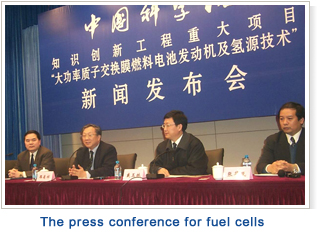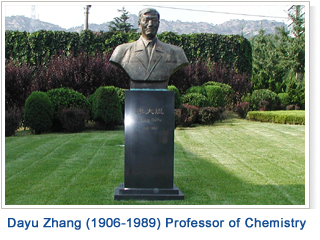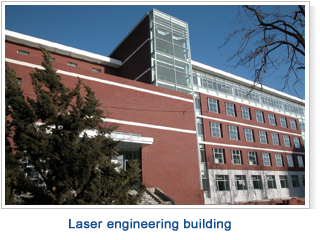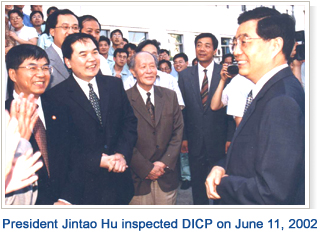|
|
Dalian Institute of Chemical Physics |
| |
|
ArticleSource: |
|
Update time: |
2009-07-03 |
|
Dalian Institute of Chemical Physics (DICP), ChineseAcademy of Sciences (CAS) was founded in March, 1949. It is a multidisciplinary institute engaging in both fundamental and applied researches of chemistry and chemical engineering, especially with strong abilities for technological development.
Over the span of half a century, DICP has conducted researches of many fields, all integrating closely with the needs of national economic reconstructions. It has developed its own features in catalytic chemistry, engineering chemistry, organic synthetic chemistry, chemical lasers and molecular reaction dynamics, as well as in modern analytical chemistry, especially in chromatography. A large number of achievements have been obtained, which have made important contribution in national economic reconstructions
 During the 1950’s, to satisfy the urgent needs of the country, this institute had developed novel catalysts for the Fische-Tropsch synthesis process to produce syn-fuels from coal, and for the preparation of toluene via cyclization of C7-fractions. In the 1960’s, the institute had developed a unique hydroisomerization catalyst for the preparation of low-freezing jet fuels. Moreover, a new process for the purification of feed gases for ammonia synthesis had been developed, which made the ammonia synthesis industry of China attained an advanced level of the world at that time. In the 1970’s, the investigation of hydrogen-oxygen fuel cells for applications in space technologies had been extensively started, and two series of fuel cells had been prepared firstly in China for use as the main energy sources in space vehicles and satellites. Meanwhile, various types of hydrazine decomposition catalysts for attitude control of satellites were successfully created, which had made great contributions to the development of our country’s space technologies. In the 1980’s, processes for the separation of nitrogen and hydrogen by means of hollow fiber membranes were developed, and had extensive applications for the recovery of hydrogen from purge gases in China. These achievements had filled up a blank area in C During the 1950’s, to satisfy the urgent needs of the country, this institute had developed novel catalysts for the Fische-Tropsch synthesis process to produce syn-fuels from coal, and for the preparation of toluene via cyclization of C7-fractions. In the 1960’s, the institute had developed a unique hydroisomerization catalyst for the preparation of low-freezing jet fuels. Moreover, a new process for the purification of feed gases for ammonia synthesis had been developed, which made the ammonia synthesis industry of China attained an advanced level of the world at that time. In the 1970’s, the investigation of hydrogen-oxygen fuel cells for applications in space technologies had been extensively started, and two series of fuel cells had been prepared firstly in China for use as the main energy sources in space vehicles and satellites. Meanwhile, various types of hydrazine decomposition catalysts for attitude control of satellites were successfully created, which had made great contributions to the development of our country’s space technologies. In the 1980’s, processes for the separation of nitrogen and hydrogen by means of hollow fiber membranes were developed, and had extensive applications for the recovery of hydrogen from purge gases in China. These achievements had filled up a blank area in C hina. Then in the last decade of the 20th century, the institute had invented a proprietary process for the production of ethylbenzene from the by-producing ethylene in the FCC dry gases, and this process has opened a new route for the rational utilization of gaseous resources in petroleum refineries. Furthermore, the research in short wave length chemical lasers has attained internationally advanced level. hina. Then in the last decade of the 20th century, the institute had invented a proprietary process for the production of ethylbenzene from the by-producing ethylene in the FCC dry gases, and this process has opened a new route for the rational utilization of gaseous resources in petroleum refineries. Furthermore, the research in short wave length chemical lasers has attained internationally advanced level.
Ever since it’s founding, the institute has cultivated a number of scientists and academic leaders who have earned prominence both in China and aboard. Many younger scientific and technical elites have also been brought up in this institute. Ten distinguished scientists of DICP have been elected as Members of the ChineseAcademy of Science and two scientists have been elected as Members of Chinese Academy of Engineering. There are 590 staffs including 76 professors of whom 50 professors are below 45 years old by the end of June, 2003.
DICP is one of first batches of the institutions in China accredited by the Degree Commitment of the State Council for supervising and granting Ph.D. and Master Degrees of chemistry and chemical engineering. At present, DICP has 50 PhD supervisors

Up to now, DICP has established extensive academic and technological cooperation and exchange relations with institutions of 32 countries. A total of 1,800 scientists from different countries have visited this institute, while 1100 scientists and 300 graduate students from DICP have been dispatched abroad for academic exchanges.
DICP has focused its research on the “selectivity-control in chemistry and chemical engineering” and pursues creativity in strategic, pioneering and basic studies. It has ten laboratories, including three state key laboratories and three national centers. The strategy for the development of DICP in the coming decade is as follows: taking sustainable energy sources as the dominant research area, while maintaining a coordinative development in the optimization of environmental resources and the innovation of biotechnologies. The final goal is to make DICP a world-class institute which possesses strong competition abilities and has a rational layout in research area, integrating comprehensively pioneering basic studies with strategic and creative hi-tech R/D’s as well as hi-tech industrialization.
President Zemin Jiang inspected DICP on August 20, 1999, and gave a remark to DICP in his own calligraphic handwriting as follows: Implement the Knowledge Innovation Program and make DICP a first class institute in the world.
Vice-President Jintao Hu inspected DICP on June 11, 2002, and encouraged the scientific research personnel: To reach the peak of science and technology continuously, to make a greater contribution to scientific undertakings, economy and society development of China.
|
|
|